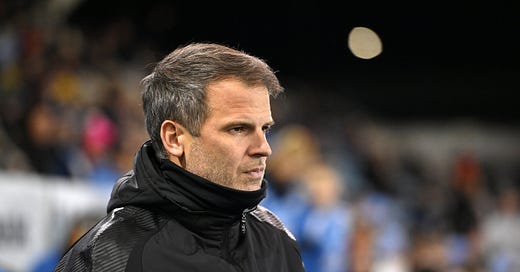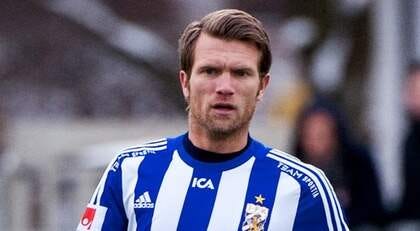Robert Vilahamn's brother reflects on his career and proud family moment
Growing up in a small town, Tottenham Hotspur manager Robert Vilahamn had four brothers and a sister. One of them, Fredrik Risp, discusses his brother's unique journey...
Fredrik Risp is on the way home from coaching his daughter’s football team. Risp is a busy guy, because he’s also a football agent off the back of a playing career which saw him play in several different countries, and on Saturday he flies to England for the Women’s FA Cup final.
Why? Because he’s the brother of Tottenham Hotspur head coach Robert Vilahamn, not that their names would offer any clues.
“I changed my name way back when I got married,” he laughs. “Rob did the same, so not everyone knows we are brothers!
Football intertwines within Risp’s life at every twist and turn, whether it be his own agency, coaching his 14-year-old daughter or the fact his older son currently plays for BK Häcken’s U19s.
Risp and Vilahamn have three other brothers and a sister, all of whom played football at some point, while their mum also played briefly before giving birth to eldest son Risp when she was just 19.
For a family who lived in a remote area of Sweden with a population which would barely fill one block of Wembley’s 82,000-seater stadium, it’s a huge achievement one has made it this far, though Risp’s own playing career was impressive enough it saw him represent IFK Göteborg – alongside his brother – as well as several clubs in Turkey – and the Swedish national team three times.
“Football has always been a big part of our lives,” admits Risp. “All of us played, our mother played, so there was always football in the backyard from when we were really, really young.”
Vilahamn is just over two years younger than Risp and in many ways followed his older brother’s early footsteps, heading too to IFK Göteborg a few years after Risp signed for the club they both supported growing up.
But while Risp was already married and living together in the big city with his wife, Vilahamn moved on his own, a world away from the quaint fishing village he’d grown up in, and has admitted himself he wasn’t in a position to make the most of his career and deal with what he’d thrown himself into.
Check out over 100 more unique stories in WFC’s Premium section, available for just £45 for 12 months, paid in one go, or a £6 a month rolling subscription.
All subscriptions come with a 7-day free trial to allow you to explore our full archive.
Plus, guarantee you everything that is to come over the next 12 months…
“I met my wife in school and married at 19,” recalls Risp. “My brother moved down as a teenager and was not prepared I think for the life of becoming an elite footballer at that age. Even though I was around him, and of course he was motivated to reach the top, he was not maybe as professional as he needed to be to make the necessary steps.
“He made the first team, of course, we had one season together with IFK Göteborg, he was never really a starting player but we did have one or two starts together and it’s nice to remember those times. I played abroad for 10 years and he was struggling a little bit, had some injuries and had to drop down a few levels.
“I think when he finally understood he had to do something with his life and couldn’t be a top level player he educated himself. He was a coach as a hobby to start with, a playing-coach at the fifth level before he was even 30, worked himself up and became more and more determined to make it in the full-time world. He had a full-time job as a PE teacher and in the evening coached the local team, he spent a lot of time away from home to pursue his dream. It’s been a remarkable journey in many ways.”
Risp can’t pinpoint a moment the penny dropped for his younger brother, but believes his job working with children as a teacher aided him with “how to reach out to people” and the affect he could have on other people’s lives through being a coach.
After spending several years as a player-assistant coach at lower league side Ytterby IS, Vilahamn didn’t take on his first head coach role until he joined Qviding FIF only seven years ago.
“I think his job in the school helped him a lot with that kind of how to reach out to people, how to talk to people and find that human being behind the football player.
“I think that’s been his key thing in his coaching career, he’s been able to motivate everyone even those not in the starting eleven who might get a chance later on. I think it was key for him he had that experience first and ultimately when he became a full-time coach he knew what tools to use.”
Risp says neither he nor his brother “considered anything else” than becoming a footballer, but their careers went in different directions both physically in terms of location, and success as Vilahamn turned his attentions towards being a coach.
When he got his big break as assistant head coach of BK Häcken’s men’s team, Risp had a feeling he wanted to be a number one, but was not experienced enough to take over the role at one of Sweden’s biggest clubs having been previously working in the third division.
But then a break came his way as BK Häcken took over the running of the previous season’s Damallsvenskan champions Kopparbergs/Göteborg, ensuring a top-class women’s team was under the club banner, and Vilahamn was the man tasked with taking the team forward as he stepped into the women’s game for the first time.
After several seasons competing for both league and cup honours, he joined Tottenham Hotspur last summer, which brings us full circle to the present as he prepares to lead his team out at Wembley on Sunday, something he himself probably couldn’t have imagined only a few years ago.
Risp now believes he is using his failings as a player not only to be a better coach, but to make sure his players don’t make the same mistakes.
“I think he is using that to motivate his players as well,” he says. “Use their potential and live in the present, he can use that as a reference and use every session to become better. I don’t know when exactly he realised he needed to make a change but I think he was in his mid twenties, he couldn’t get back to the top division, educated himself and slowly went into coaching. He played lower level just for fun and started from grassroots more or less as a coach.
“He was lucky to have good people around him in those first years, good mentors, but I’m really proud of the journey he’s been on. When he became head coach of BK Häcken’s women’s team, it was a big decision, he was on a journey with the men’s team and could choose which direction and I think he was a bit fed up with being assistant, he wanted to express his kind of football, so the timing was good for him with Hacken taking over the women’s team.”
Risp will be flying in with his brother and sister to be in the stadium on Sunday and the enormity of his brother’s achievement for a family who grew up in a tiny part of remote Sweden is not lost on him
“We are all very proud. It’s a huge moment. Hopefully they can get a good result but no matter what it’s a remarkable journey so far, not just the cup but Tottenham as a team has done really well and Robert has shown he has a style he’s able to implement I think they’ll be very happy with him so far.”
The sacrifices of families are also not lost on Risp, with Vilahamn fortunate to have both his wife Sofie and his children move to London with him, in stark contrast to the sole teenager who moved to Gothenburg over 20 years ago.
Risp too has a family and opens up about the importance it will have had for his brother to have family by his side and how the success spreads across the whole wider family tree.
“100%, it’s true. Many people from the outside have an idea and of course it’s a privileged life to live in the football bubble, but there’s still a lot of sacrifices. Your schedule doesn’t change from 16 to when you retire, you’re constantly having someone tell you what to do and what not to do.
“I missed the birth of my son because I was in Turkey and my wife was in Sweden. There are all these things people might not understand, when you have a contract you have to fulfil that. It’s a lifestyle and you love it but families make a lot of sacrifices for us to fulfil our dreams and you depend on the people around you.”




